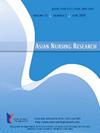Predictive Factors for Infusion Site Induration After Outpatient Chemotherapy in Japan: A Secondary Analysis
IF 2.1
3区 医学
Q2 NURSING
引用次数: 0
Abstract
Purpose
Even in the absence of extravasation, some patients develop induration at the peripheral intravenous catheterization site prior to the next day's treatment. Infusion site induration commonly affects patients who undergo repeated chemotherapy administrations. Vessel health is crucial for the continuation of chemotherapy. However, there is no effective method to prevent induration. Hence, this study aimed to investigate the factors that could cause induration for preventing its occurrence.
Methods
This study was a secondary analysis of a prospective observational study. All participants were undergoing outpatient chemotherapy. Participant characteristics and related catheterization data were collected on the treatment day as baseline, and induration incidence was recorded on the subsequent treatment day. Receiver operating characteristic (ROC) analysis was performed to determine the sensitivity and specificity of cutoff points of the vein and catheter diameter ratios for distinguishing between developed induration and not developed induration. Additionally, cox regression analysis with multiple imputation was used to investigate the factors that predicted induration.
Results
Seventy-one patients participated in the study. The cutoff point of the vein/catheter diameter ratio calculated using ROC analysis was ≥3.7. The ratio of larger-diameter veins to catheter diameter of ≥3.7 times was negatively associated with induration in both complete case analysis (HR: 0.11; p = 0.034) and multiple imputation analysis (HR: 0.12; p = .049).
Conclusions
Selecting the vein with 3.7 times higher diameter than the catheter diameter for the catheterization site may help prevent induration on the next treatment day.
日本门诊化疗后输液部位压痕的预测因素:二次分析
目的:即使在没有外渗的情况下,一些患者在第二天治疗前,周围静脉置管部位出现硬结。输注部位硬化通常影响反复化疗的患者。血管健康对化疗的持续至关重要。然而,目前尚无有效的方法来预防硬结。因此,本研究旨在探讨可能导致硬结的因素,以预防其发生。方法本研究为前瞻性观察性研究的二次分析。所有的参与者都在接受门诊化疗。在治疗当天收集受试者特征及相关置管资料作为基线,并在随后的治疗当天记录硬结发生率。进行受试者工作特征(ROC)分析,以确定静脉和导管直径比截断点的敏感性和特异性,以区分已形成的硬结和未形成的硬结。此外,采用cox回归分析和多重输入分析来探讨预测硬结的因素。结果71例患者参与研究。ROC分析计算的静脉/导管直径比的分界点≥3.7。在两个完整病例分析中,大直径静脉与导管直径之比≥3.7倍与硬结呈负相关(HR: 0.11;p = 0.034)和多重输入分析(HR: 0.12;P = .049)。结论选择直径大于导管直径3.7倍的静脉作为置管部位,可预防次日治疗时的硬结。
本文章由计算机程序翻译,如有差异,请以英文原文为准。
求助全文
约1分钟内获得全文
求助全文
来源期刊

Asian Nursing Research
NURSING-
CiteScore
4.20
自引率
4.50%
发文量
32
审稿时长
45 days
期刊介绍:
Asian Nursing Research is the official peer-reviewed research journal of the Korean Society of Nursing Science, and is devoted to publication of a wide range of research that will contribute to the body of nursing science and inform the practice of nursing, nursing education, administration, and history, on health issues relevant to nursing, and on the testing of research findings in practice.
 求助内容:
求助内容: 应助结果提醒方式:
应助结果提醒方式:


